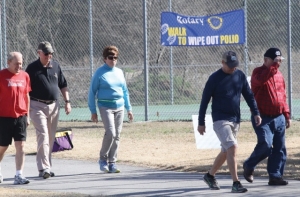Polio walk fares well with warm weather
By Steve Herring
Published in News on February 25, 2017 11:53 PM

News-Argus/STEVE HERRING
Local Rotarian Saturday sponsored their third annual 5K Walk to Wipe Out Polio 5K at Wayne Community College. From left are Dean Nelson, Bryson Bateman, Charlotte Campbell, Ashley Fleming and Tommy Jarrett.
The thinking had been that Saturday morning's 5K Walk to Wipe Out Polio was going to be the hot chocolate walk.
Instead, spring-like weather had the nearly two dozen walkers in shorts and short sleeves as they made eight circuits around the track circling the tennis courts at Wayne Community College.
After several laps, some reached into a cooler to grab bottles of chilled water.
Proceeds from the third annual walk were not available prior to press time Saturday.
The walk is sponsored by Rotary District 7720's Area 7 that includes Rotary clubs in Fremont, Goldsboro, Mount Olive and Three Eagles, and the Greene County club in Snow Hill.
"We were supposed to do this in the fall, but the hurricane got in the middle of everything," said Bryson Bateman, Polio Plus chair for the district that includes 40 Rotary Clubs in eastern North Carolina.
Rotary began its association with the fight against polio in the 1970s by sending three-quarters of a million dollars to the Philippines to immunize 6 million children, Bateman said.
At the 1985 Rotary International convention, Albert Sabin, who developed the Sabin vaccine, was the quest speaker.
"He made it very clear that going from country to country, which was the model that everybody was using at the time -- raise money, go in and immunize kids -- that you were never going to get a handle on the disease," Bateman said
Sabin told Rotarians it would require a global effort, Bateman said.
The Global Polio Eradication Commission was formed through a partnership of Rotary International, the World Health Organization, the Centers for Disease Control, UNICEF and the Bill and Melinda Gates Foundation.
Most people had figured the project would be done by the end of the last century. It hasn't, Bateman said.
In 1985, there were 350,000 to 370,000 cases worldwide. Last year, there were 37, he said.
The number of countries where polio still exists has been reduced from more than 100 to three -- Afghanistan, Pakistan and Nigeria.
There are many challenges working in those countries particularly the poverty and remoteness of those areas, conflict zones, superstitions and religious objections, Bateman said.
"That is why local Rotarians are so important, they can cut through that stuff," he said "When it started out (the) Rotarians' job was not only raising money, but gaining access to health ministries and arranging for volunteers. They have the access, and they can convince the politicians to get involved in theses things. That was really essential because you had to have the buy in of locals to be able to make this work."
Worldwide the Rotary Foundation has spent $3.7 billion on various projects of which about half has gone into polio eradication, he said.
"We want to raise as much money as we can to end this disease," Bateman said.
